#brazilian indigenous people
Explore tagged Tumblr posts
Text
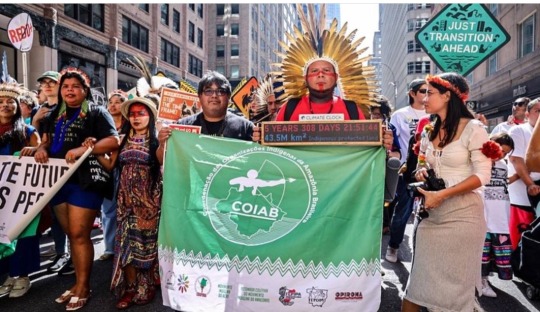
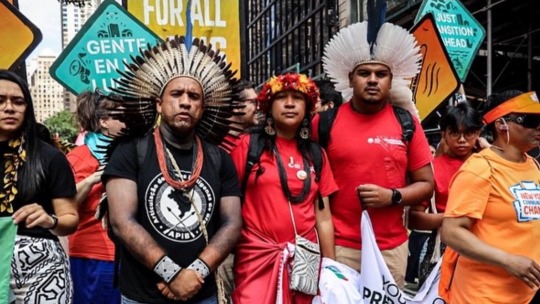
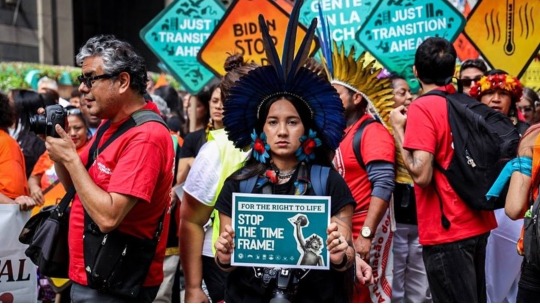
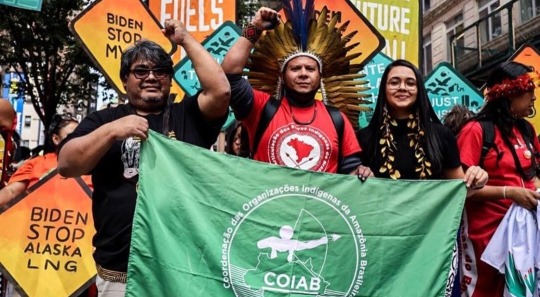
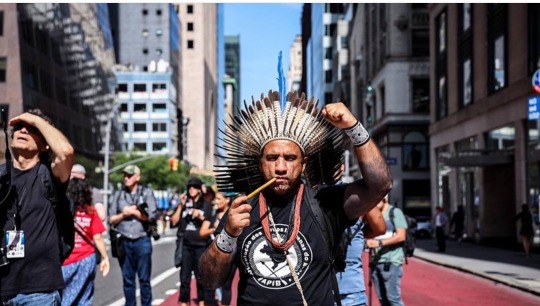
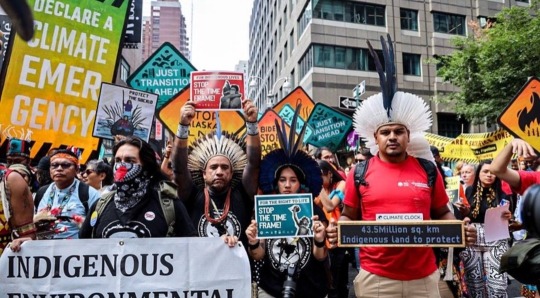
"Trial scheduled for September 20th at the Supreme Federal Court may determine the future of Indigenous Lands in Brazilian territory and be crucial for the global climate. The indigenous movement is mobilizing across Brazil, and an indigenous delegation from Apib is in New York during Climate Week to strengthen the international mobilization campaign in defense of Indigenous Lands rights."
"We are on the land, and the land is within us. If the land dies, we as indigenous peoples die."
The Articulação dos Povos Indígenas do Brasil (Articulation of Indigenous Peoples of Brazil — APIB) is calling for nationwide mobilizations this week and participating in the New York Climate Week to alert the world to the risks of the Supreme Federal Court (STF) judgment scheduled for September 20th. The court will vote on the legitimacy of the legal concept known as the "Temporal Framework," advocated by the Brazilian agribusiness, which could reevaluate Indigenous Land demarcations and impact global climate crisis mitigation efforts.
The Temporal Framework suggests that only indigenous people who can prove they were living on the land in 1988, the same year the Federal Constitution was created, should have rights to the land. This disregards the forced displacements of hundreds of indigenous groups who could only reclaim their traditional lands after Brazil's redemocratization in the late 1980s.
This week, the 15th edition of Climate Week is taking place in New York from September 17th to 24th, alongside the 78th Session of the United Nations General Assembly from September 19th to 23rd, which will feature a speech by President Lula during its opening. A delegation of 10 indigenous leaders is in New York to participate in Climate Week's activities. The international mobilization's goal is to emphasize to the world that the Temporal Framework is a threat to the lives of Brazil's indigenous peoples and could exacerbate the climate crisis, as Indigenous Lands serve as a reservoir of life on the planet.
Apib and its regional organizations are reinforcing mobilizations in territories, cities, and Brasília against the Temporal Framework on September 20th. The goal is to monitor the trial and strengthen the next steps of the indigenous movement's fight. The organizations within Apib mobilized over 220 protests in 21 states, including the Federal District, between May and June.
Five Supreme Federal Court (STF) justices are yet to vote in the trial. The current tally stands at four votes against the Temporal Framework thesis and two in favor. Justices Edson Fachin, Alexandre de Moraes, Cristiano Zanin, and Luís Roberto Barroso have expressed opposition to the agribusiness-backed thesis, while the only favorable votes came from justices appointed by former President Jair Bolsonaro, André Mendonça, and Nunes Marques.
On the same day as the STF vote, the Brazilian Senate attempts to put the Temporal Framework into law. The ruralist caucus in Congress seeks to create tension with the Brazilian judiciary since there is a possibility that the STF may invalidate the Temporal Framework thesis.
In addition to the Temporal Framework, Bill 2903 proposes other setbacks to the rights of indigenous peoples, such as the construction of highways and hydroelectric plants in indigenous territories without free, prior, and informed consent from affected communities. The proposal also aims to allow farmers to enter production contracts with indigenous people, violating the rights of indigenous peoples to the exclusive use of demarcated territories.
While some falsely claim that "there is too much land for too few indigenous people in Brazil," Apib counters that there is too much land for too few farmers and that agribusiness promotes the illegal invasion of indigenous lands. The entity asserts,
"There is no solution to the climate crisis without guaranteeing the rights of indigenous peoples and the demarcation of their territories."
Currently, nearly half of Brazil's land is in the hands of rural producers. Of the total land in the country, 41% corresponds to rural properties, 13.7% to indigenous lands, and 45.2% to other purposes, according to data published in the Official Gazette of the Union. Indigenous Lands are a guarantee of life for indigenous peoples and for all of humanity, which depends on the climate's future.
"As worsening climate crisis unfolds, many will be marked in history as accomplices to the new colonialism threatening the survival of us, indigenous peoples who inhabit the vast territory known as Brazil, and the future of all humanity because there is no solution to the climate crisis without the involvement of indigenous peoples," emphasizes Dinamam Tuxá.
Key activities of Apib during the 15th edition of Climate Week from September 17th to 24th:
On September 17th, Apib participated in the Climate Week march through the streets of New York in support of the Fight Fossil Fuel Strike. The indigenous delegation from Apib denounced the threat posed by the Temporal Framework thesis, highlighted the indigenous emergency situation concerning extractive industries and agribusiness that lead to multiple instances of violence in our territories. Additionally, as part of the Climate Week agenda, it's worth noting that Apib's executive coordinators Kleber Karipuna, Dinamam Tuxá, and other members of the indigenous delegation will participate in a talk on September 19th titled "FCLP: Rights, Participation, and Benefits for Indigenous Peoples and Local Communities in Forest Climate Financing," organized by the Forest and Climate Leaders Partnership. On September 22nd, a portion of the delegation will be present at a dialogue co-organized with H.E Razan Al Mubarak, the current president of the International Union for Conservation of Nature, to assess progress in the COP28 agenda with the aim of collectively identifying meaningful and respectful ways for Indigenous Peoples to engage in the COP.
About APIB
The Articulation of Indigenous Peoples of Brazil (Apib) is a nationally recognized entity within the indigenous movement in Brazil, created from the grassroots up. It brings together seven regional indigenous organizations (Apoinme, ArpinSudeste, ArpinSul, Aty Guasu, Conselho Terena, Coaib, and Comissão Guarani Yvyrupa) and was founded with the purpose of strengthening the unity of our peoples, fostering coordination among different regions and indigenous organizations across the country, as well as mobilizing indigenous peoples and organizations against threats and infringements on indigenous rights.
Support/donate to APIB
APIB Instagram page
APIB Website
#yara.txt#brasil#brazil#latin america#america latina#south america#brazilian politics#brazilian indigenous people#indigenous people#indigenous#native american#native women#first nations#ndn#ndn tag#ndn tumblr#latinoamerica#environmentalism#climate crisis#climate emergency#nature#naturism#naturist#anti capitalism#capitalism#anti colonialism#anti colonization#colonialism#colonization#neocolonialism
190 notes
·
View notes
Text
Sign the petition to help the Brazilian Indigenous people!
((UPDATE: Lula finally announced the PARTIAL veto of Bill 2903, which will be published in the next few days--i can't wait to see exactly WHAT was removed from it. A huge thank you to everyone who signed the petition, liked, and rb the post, you're all amazing!))
TLDR: Greedy Brazilian landowners in the Senate are trying to strong-arm the government into allowing them to steal BR Indigenous lands. Please sign the petition and help them protect their sacred lands and homes!
A few months ago, I posted about the situation of the Brazilian Indigenous people and their fight in the Senate to ensure their right to their ancestral land. The BR Supreme Federal Court voted and, 9x2, decided in FAVOR of the Br Indigenous People...
But that wasn't the end of it. In a disgusting show of unconstitutional disregard for the BR people, the Federal Senate approved Bill 2903, seeking to bypass the Supreme Federal Court and allow for the legalized stealing of Indigenous land.
The vote in the Senate resulted in 43 in favor and 21 against PL 2903. "Among those who supported the legalization of genocide were Senators Marcos Rogério (DEM-RO), who invaded 98 hectares of indigenous land in the Jamari Valley in Rondônia; Jaime Bagattoli, who encroached on over 2,000 hectares of the Rio Omerê Indigenous Land; and Senator Tereza Cristina, former Minister of Agriculture in Bolsonaro’s anti-indigenous government." (APIB, sept 28).
Now, the final decision is in the Br president's hands, and Lula has until October 20th to decide if he'll completely, partially, or not veto the bill at all.
The Br Indigenous peoples need your help! Please sign the petition created by Célia Xakriabá, one of the few indigenous members of the Brazilian Congress, and help us pressure Lula in this critical moment!
168 notes
·
View notes
Text
Brazilian Yanomami indigenous territory faces less mining, hunger
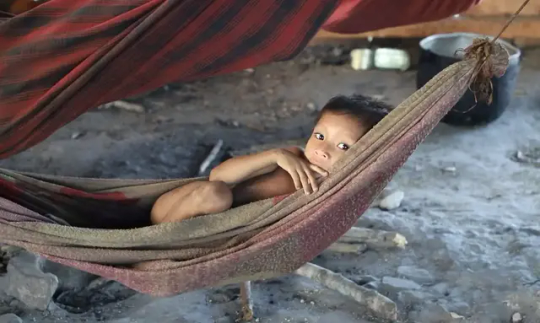
Over the past two years, public authorities and civil organizations have waged a daily battle against gold miners invading Yanomami territory, helping to address the humanitarian crisis in Brazil’s largest indigenous reserve, which is home to 376 communities and approximately 33,000 people.
As a result, mining areas within the nearly 10-million-hectare indigenous land in the states of Amazonas and Roraima, in northern Brazil, have been reduced by 91 percent.
Additionally, the Brazilian government reports a 95.76 percent decrease in the expansion of new illegal mining areas. These mines contaminate rivers, deplete natural resources for local populations, and, in addition to creating a public health crisis, have become a security threat to the region’s communities.
In 2024 alone, over 3,000 operations were conducted to combat illegal activities, with military and civilian personnel involved on a daily basis.
Continue reading.
#brazil#brazilian politics#politics#environmentalism#indigenous rights#good news#yanomami people#image description in alt#mod nise da silveira
382 notes
·
View notes
Text
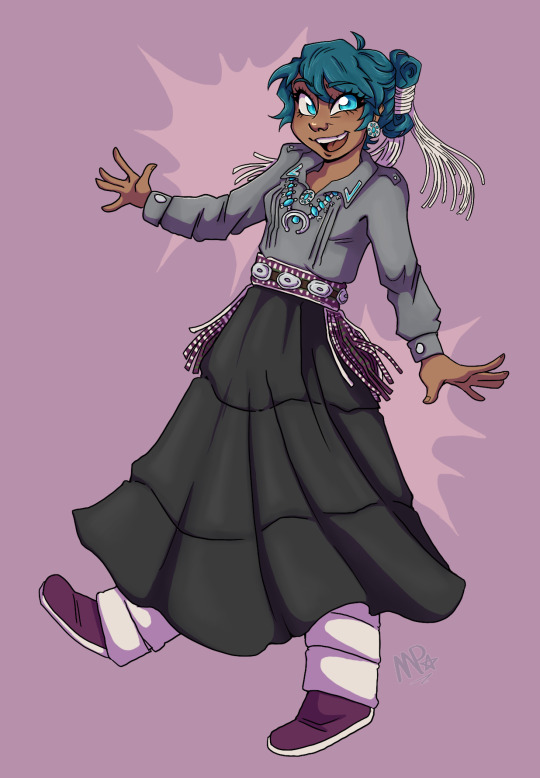

Navajo Miku🪶
#artists on tumblr#art#digital art#my art#mine#fanart#new post#hatsune miku#vocaloid miku#miku fanart#brazilian miku#navajo#indigenous#indigenous people#native americans#native american#native women#diné#ethnicity
285 notes
·
View notes
Text
Persistência e cuidado de uma criança Y’ekwana ❤️ video by Lohana Chaves
#lohana chaves#brasil#brasilcore#araracanga#ara macao#mine#ye'kwana#brasilidade#brazilian people#povo brasileiro#brasilidades#scarlet macaw#arara vermelha#arara#macaw#red macaw#indigenous#indigenous people#brazil#brazilcore#brasileiros#brasileiro#brazilian#brasil aesthetic#brazil aesthetic#cultura brasileira#brazilian culture#animals#birds
20 notes
·
View notes
Text
man i just LOVE being a brazilian haikyuu fan????? i literally just found out my city (northern brazil) has a gay volleyball league and competition and yesterday was the finals and man the video is so funny lmao
#brb im gonna write that brazilian shoyo fic i've been talking about for ages#team a lost a point so two peeps from team b started to yell aaaah to the person who last touched the ball#its so fucking funny#the only way to explain this is using gay brazilian slang you guys wouldn't understand#i love the gays lively people#brazilian author#brazilian hinata shouyou#haikyuu#hinata shoyo#hq hinata#hehe haha#local slangs are so cool too although its been a while since i met with people so i'm kinda outdated#also i need to write that fic based on local indigenous tales lol#author is sleep deprived#wanna a pão de queijo? or a x-caboquinho? *offers local food*
23 notes
·
View notes
Text







Konduri and Santarém pottery styles
"Konduri (11th-15th AD) and Santarém (13th-16th AD) pottery styles occur in neighboring areas of the Lower Amazon and are both part of the Incised and Punctuate Tradition. ‘Necked vessels’ are among the most emblematic types of pottery in the Santarém style. These vessels typically have a constricted neck with a flange, pedestal base, and lobed body, generally with two pairs of zoomorphic adornos arranged in a perpendicular manner. This study challenges the assumption that this type of vessel was exclusively associated with Santarém pottery. Diagnostic traits to recognize necked vessels from isolated potsherds were defined based on analysis of complete specimens from Santarém. Hundreds of Konduri potsherds were directly analyzed or observed from available publications in order to identify diagnostic traits indicating the existence of necked vessels. Necked vessels from Konduri contexts were seen to have their own distinct characteristics involving particular incised patterns which differ from Santarém. The presence of such a distinct type of vessel on a regional scale reinforces previous suggestions based on ethnohistorical and archaeological studies of the existence of social interactions between the producers of Santarém and Konduri pottery.
Complete article and image source here.
#art#culture#brazil#brazilian#museum#brazilian artists#indigenous#indigenous american#indigenous art#anthropology#ancient history#ancient#ceramic art#ceramic#ceramic sculpture#pottery#carving#native american#indigenous people#indigenous rights#article#art style
14 notes
·
View notes
Text
Smoke clouds and deforastation in Brasil - Mundane Astrology
Disclaimer: This post was mostly written in the beginning of September 2024. It was a very scary time and I just couldn't finish it until now that I'm better.
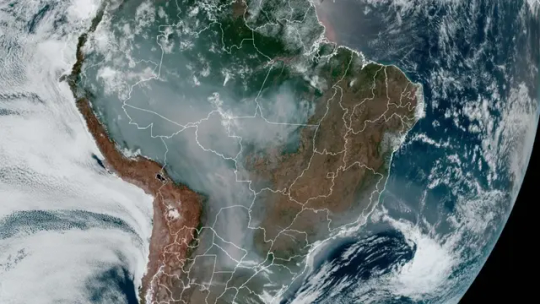
I don't know if you got the news that South America got covered with smoke clouds since at least the beginning of August, as huge areas in the Pantanal and the Amazon are burning. I promised to make posts based on the suggestions some of you made, but this is all that's been on my mind lately, because I'm smelling fire every day even as I live in a coastal city that's nowhere near them. I have a bit of a cough since June when I had a cold and then the cough persisted. Some days it was gone, but since the smoke clouds it's been consistent. I've never seen anything like it, an entire country and neighboring countries covered in smoke. To be clear, the fires are not natural, they are criminal acts, they are started for land grabbing and also probably as retaliation for the environmental protection policies of our current left-leaning government. This is also greatly done on indigenous lands. It all started after months of brutal attacks on the Guarani Kaiowá in the state of Mato Grosso do Sul, all the while threats like the Time Frame thesis are still being pushed. It's making me feel like how we all felt in those days in the beginning of the covid pandemic, when we thought we were just going to stay home for 15 days, but a sense of doom was slowly creeping, because that number just kept getting bigger until we didn't know anymore. It's been making me feel sad, angry and fearful.


Smoke in São Paulo and Goiás. The Sun looked like that for days in my town as well.
I won't talk about Brazil's chart in depth¹, but it's important to talk a little bit about the ruler of that chart, which is Saturn in Taurus in the 4th house and the Moon with Aldebaran, the star of the bull's eye. This country is marked by its agrarian issues and the inequality in the distribution of land ownership in Brazil is one of the most pronounced in the world. The largest portions of land remains in the hands of a very tiny portion of the population, who are the richest and major producers of agribusiness, while they destroy forests and invade indigenous territory. That Saturn in Taurus in the 4th shows how the project for this country at the declaration of independence was still a perpetuation of colonization, and also how we were supposed to be a peaceful people, just meant to work, to be enslaved and tame like our cattle. Brazil still has a reputation of being very festive, happy and peaceful, even as we are built on so much violence².
From outside people mostly see Rio de Janeiro and beach culture as the postcard of the country, but that disguises the greater countryside culture of deep Brazil, which is incredible but not as marketable for tourism, and it's actually hard not to see it tainted with the violence of agribusiness. As it's obvious from our very strong barbecue culture, Brazil is a leader in the export of meat and soy, and the latter is actually because it's greatly used for cattle feed. When you hear about deforestation in the brazilian part of the Amazon, or about the destruction of any natural area of this country, it's always criminal fires started by powerful landowners trying to expand their areas of agribusiness, especially for soybean plantation and for livestock, perpetuating the genocide of indigenous people, who are the most interested in protecting nature, but still don't have their lands demarcated and their rights protected without the threat of extermination.
Because of all of that, whenever we see the 4th house greatly activated for the year it's scary. The 4th house is about the forests, land and indigenous peoples. Looking at the Solar Ingress into Aries for Brasília, the country is ruled mainly by the Sun and has Mercury as the co-ruler this year.

The Sun was scorching the earth in the 4th house. In 2020 we also had the Sun in the 4th house and that was a historic year in terms of huge fires and deforestation too, when a third of the Pantanal biome was burned, so it checks out that the Sun in the 4th unfortunately signifies these things for this country in these times. Besides, Mars is the 4th house ruler, and it's in the 2nd house affecting resources, and we'll definitely see a rise in food prices because of what's happening pretty soon, which are already high. I consider its placement in Aquarius important, as Ísis notices often the recurrence of air signs in charts for fires, because they help it spread and thrive, especially the fixed air sign. The Moon in another fire sign in the 8th house doesn't help at all.
However, the IC is in Pisces with Venus and Saturn, while Mars will eventually reach them. Three weeks after the Solar Ingress, Mars met Saturn at 14° Pisces. One of the most important conjunctions to watch for in Mundane Astrology is the Mars-Saturn one, which is famous for signifying calamity and disease. Soon after the conjunction, the Full Moon in Scorpio came with those two in the 4th house. That's when we had the historic floods in Rio Grande do Sul, one of the most horrible environmental disasters we've seen. I've written about it here. The mix of fire and water signified a year with one of the worst floods and at the same time one of the worst droughts ever.
But now we're in the winter, thus we need to open up the chart for the Cancer Solar Ingress. It has the same rising sign, but this time Saturn is much more angular, and also stationary and about to go retrograde. Saturn on the IC is the co-ruler for the winter trimester.

Saturn is closer to the IC, making it a lot more powerful. He's stationary and about to go retrograde. Pretty soon he'll reach 15° Pisces where the fixed star Achernar is at and where it had its conjunction with Mars earlier in the year. Achernar is the alpha star of the constellation of the river Eridanus, which tells the myth of Phaethon, who drove the sun god Helios' chariot too close to the Earth and burned it. He gets striked by Zeus with his lighting bolt and his body falls into the river Eridanus.
Mars is still ruling the 4th house representing land and forests. He's in Taurus with the fixed star Hamal, the head of the Ram, which has his nature. So even though it's in Taurus, Mars is still very much himself. If we imagine the planets moving through the chart, we soon understand that Jupiter is going to square Saturn at some point, and Mars will do the same.
After the New Moon in Leo is when the fires got really wild and we got the smoke cloud covering almost the entire continent. On August 14 there was one big trigger for this: the Mars-Jupiter conjunction at 16° Gemini squaring Saturn. Nothing more symbolic of a continent-sized cloud of smoke above our heads than Mars-Jupiter in an air sign on top of the MC. As I've said, these are not wild fires, they're being coordinated, some were on caught on camera, that's why we see the 12th house activated, as it indicates hidden enemies and criminal activity.

Things got worse with the Full Moon, which was at 27° Aquarius, the exact degree of that Mars of the Aries Ingress chart. And this is where we're still at. I'm still smelling fire most of the time, especially at night for some reason, because I guess at night the air changes or something, I don't think anyone is trying to explain this enough. The sky looks like it's completely clouded, but the Sun is orange and its light is direct. I'm still coughing.
Aftermath
This is a very scary thing to just throw at you, so for anyone who cares about environmental issues I'll leave some more links about research that were made, measures that are being taken until now, things you could look up, follow or read about, etc.
278.3 thousand fire outbreaks registered in 2024;
The government strategies that are being taken;
Mídia Indígena - An indigenous communication collective from Brazil;
Articulação do povos indígenas do Brasil, an association of entities representing indigenous people;
About the struggle for land in Brazil and MST , the largest popular movement in Latin America, which is aimed at land reform;
Ailton Krenak, legendary indigenous leader of the krenak people, environmentalist and author of "Ideas to Postpone the end of the World", "Ancestral Future", "Life is Not Useful" etc;
Davi Kopenawa, yanomami political leader and author of "The Falling Sky: Words of a Yanomami Shaman";
Marina Silva, the current Minister of Environment and Climate Change, a very important politician in our environmental politics;
Ministry of the Indigenous Peoples, presided by Sônia Guajajara.
-----
¹ We mostly use the 1822 chart of the Declaration of Independence, although there are other important ones.
² Zé Ramalho captured our Taurean project pretty well in song: Admirável Gado Novo.
#mundane astrology#astrology readings#brazilian politics#climate change#latin american politics#environmental politics#pantanal#traditional astrology#hellenistic astrology#fixed stars#indigenous peoples#indigenous rights#climate crisis#reforma agraria
7 notes
·
View notes
Text
Indigenous History Month Fact #6
Indigenous people in Brazil would often take in escaped Black people. This happened so often that the unique communities they formed even have a name: quilombos.
Quilombos were free communities that fought back against Europeans, and they could be quite large.
The most famous is Quilombo dos Palmares.

#little known fact#random fact#random facts#did you know#random factoid#random factoids#country facts#history facts#brazil#brazil facts#quilombos#brazilian history#indigenous history#indigenous peoples
8 notes
·
View notes
Text
Do you speak rez?🤣
youtube
This reminds me of a story my mom likes to tell about when she was in uni:
There were some German exchange students that she and her group of friends had taken under their wing and one day they were heading out to do something or other.
My mom's (also Brazilian) friend, Titane, was like "Então, vam in'?" and the German students were like "???". So, seeing as they were still learning the language and all, Titane patiently repeated slowly "Vaaamuuu iiiinuuu".
Shockingly, that did not help.
Context for Non-Brazilians: The textbook way to say what Titane wanted to say was "Vamos indo?" (literally, "shall we go?").
However, in the state of Minas Gerais we're infamous for always shortening and smooshing our words (kinda like Southern dialects in the US or the Newfie dialect in Canada), so textbook dialect isn't always the most helpful. lol
#Youtube#brazil#indigenous humour#indigenous people#brazilian portuguese#langblr#portuguese#portuguese language#portuguese langblr#minas gerais#lol#facepalm#dialects#linguistics#languages#language stuff#slang#youtube video#youtube shorts#native humour
5 notes
·
View notes
Text


"Victory!
"Today, the vote on the Temporal Framework thesis concluded, with indigenous peoples securing a majority of votes in the Supreme Federal Court.
The trial is still ongoing, and we will continue to monitor to ensure our rights are respected. We, indigenous women, will also lead this fight against the Temporal Framework with our bodies as territories, striving for a better future through land demarcation and thus combating the climate crisis.
We dedicate this victory to our Women of the Land, Roots, and Seeds of the Xokleng people in the Atlantic Forest, who never gave up dreaming of this victorious day, and we remain committed to advocating for the Biomes Women of Brazil.
Defending the territory is defending life."






"Trial scheduled for September 20th at the Supreme Federal Court may determine the future of Indigenous Lands in Brazilian territory and be crucial for the global climate. The indigenous movement is mobilizing across Brazil, and an indigenous delegation from Apib is in New York during Climate Week to strengthen the international mobilization campaign in defense of Indigenous Lands rights."
"We are on the land, and the land is within us. If the land dies, we as indigenous peoples die."
The Articulação dos Povos Indígenas do Brasil (Articulation of Indigenous Peoples of Brazil — APIB) is calling for nationwide mobilizations this week and participating in the New York Climate Week to alert the world to the risks of the Supreme Federal Court (STF) judgment scheduled for September 20th. The court will vote on the legitimacy of the legal concept known as the "Temporal Framework," advocated by the Brazilian agribusiness, which could reevaluate Indigenous Land demarcations and impact global climate crisis mitigation efforts.
The Temporal Framework suggests that only indigenous people who can prove they were living on the land in 1988, the same year the Federal Constitution was created, should have rights to the land. This disregards the forced displacements of hundreds of indigenous groups who could only reclaim their traditional lands after Brazil's redemocratization in the late 1980s.
This week, the 15th edition of Climate Week is taking place in New York from September 17th to 24th, alongside the 78th Session of the United Nations General Assembly from September 19th to 23rd, which will feature a speech by President Lula during its opening. A delegation of 10 indigenous leaders is in New York to participate in Climate Week's activities. The international mobilization's goal is to emphasize to the world that the Temporal Framework is a threat to the lives of Brazil's indigenous peoples and could exacerbate the climate crisis, as Indigenous Lands serve as a reservoir of life on the planet.
Apib and its regional organizations are reinforcing mobilizations in territories, cities, and Brasília against the Temporal Framework on September 20th. The goal is to monitor the trial and strengthen the next steps of the indigenous movement's fight. The organizations within Apib mobilized over 220 protests in 21 states, including the Federal District, between May and June.
Five Supreme Federal Court (STF) justices are yet to vote in the trial. The current tally stands at four votes against the Temporal Framework thesis and two in favor. Justices Edson Fachin, Alexandre de Moraes, Cristiano Zanin, and Luís Roberto Barroso have expressed opposition to the agribusiness-backed thesis, while the only favorable votes came from justices appointed by former President Jair Bolsonaro, André Mendonça, and Nunes Marques.
On the same day as the STF vote, the Brazilian Senate attempts to put the Temporal Framework into law. The ruralist caucus in Congress seeks to create tension with the Brazilian judiciary since there is a possibility that the STF may invalidate the Temporal Framework thesis.
In addition to the Temporal Framework, Bill 2903 proposes other setbacks to the rights of indigenous peoples, such as the construction of highways and hydroelectric plants in indigenous territories without free, prior, and informed consent from affected communities. The proposal also aims to allow farmers to enter production contracts with indigenous people, violating the rights of indigenous peoples to the exclusive use of demarcated territories.
While some falsely claim that "there is too much land for too few indigenous people in Brazil," Apib counters that there is too much land for too few farmers and that agribusiness promotes the illegal invasion of indigenous lands. The entity asserts,
"There is no solution to the climate crisis without guaranteeing the rights of indigenous peoples and the demarcation of their territories."
Currently, nearly half of Brazil's land is in the hands of rural producers. Of the total land in the country, 41% corresponds to rural properties, 13.7% to indigenous lands, and 45.2% to other purposes, according to data published in the Official Gazette of the Union. Indigenous Lands are a guarantee of life for indigenous peoples and for all of humanity, which depends on the climate's future.
"As worsening climate crisis unfolds, many will be marked in history as accomplices to the new colonialism threatening the survival of us, indigenous peoples who inhabit the vast territory known as Brazil, and the future of all humanity because there is no solution to the climate crisis without the involvement of indigenous peoples," emphasizes Dinamam Tuxá.
Key activities of Apib during the 15th edition of Climate Week from September 17th to 24th:
On September 17th, Apib participated in the Climate Week march through the streets of New York in support of the Fight Fossil Fuel Strike. The indigenous delegation from Apib denounced the threat posed by the Temporal Framework thesis, highlighted the indigenous emergency situation concerning extractive industries and agribusiness that lead to multiple instances of violence in our territories. Additionally, as part of the Climate Week agenda, it's worth noting that Apib's executive coordinators Kleber Karipuna, Dinamam Tuxá, and other members of the indigenous delegation will participate in a talk on September 19th titled "FCLP: Rights, Participation, and Benefits for Indigenous Peoples and Local Communities in Forest Climate Financing," organized by the Forest and Climate Leaders Partnership. On September 22nd, a portion of the delegation will be present at a dialogue co-organized with H.E Razan Al Mubarak, the current president of the International Union for Conservation of Nature, to assess progress in the COP28 agenda with the aim of collectively identifying meaningful and respectful ways for Indigenous Peoples to engage in the COP.
About APIB
The Articulation of Indigenous Peoples of Brazil (Apib) is a nationally recognized entity within the indigenous movement in Brazil, created from the grassroots up. It brings together seven regional indigenous organizations (Apoinme, ArpinSudeste, ArpinSul, Aty Guasu, Conselho Terena, Coaib, and Comissão Guarani Yvyrupa) and was founded with the purpose of strengthening the unity of our peoples, fostering coordination among different regions and indigenous organizations across the country, as well as mobilizing indigenous peoples and organizations against threats and infringements on indigenous rights.
Support/donate to APIB
APIB Instagram page
APIB Website
#updates#brasil#brazil#latin america#america latina#south america#brazilian politics#brazilian indigenous people#indigenous people#indigenous#native american#native women#first nations#ndn#ndn tag#ndn tumblr#latinoamerica#environmentalism#climate crisis#climate emergency#nature#naturism#naturist#anti capitalism#capitalism#anti colonialism#anti colonization#colonization#colonialism#neocolonialism
190 notes
·
View notes
Text
I was trying to find out how a museum in Parma ended up with (apparently) 500 Kayapò pieces in their collection and ran into this article instead... gave me some hope for Brazilian museums and museums in general, at least.
This part was heartbreaking however:
Over the past few years, multiple Guarani-Kaiowá prayer houses — large, thatched structures used for religious events, festivities and community meetings — have been set on fire in Mato Grosso do Sul. In 2018, when Benites told Guarani-Kaiowá communities about the National Museum fire, they expressed sympathy rather than anger. They assumed the fire had been deliberately set by people who wanted to destroy the Indigenous artifacts housed within. “For the Guarani-Kaiowá, somebody got there, didn’t like what they saw and set the place on fire,” Benites says. “Because this is what it’s like here.”
4 notes
·
View notes
Text
Denmark returns iconic indigenous cloak to Brazil

The National Museum of Denmark is handing over an iconic cloak belonging to an indigenous group in Brazil at a ceremony being attended by President Luiz Inácio Lula da Silva.
Considered sacred by the indigenous Tupinambá people, the garment was taken from Brazil during the Portuguese colonial period and has been on display in Copenhagen since 1689.
The 1.8m-long cloak is made of 4,000 red feathers from the scarlet ibis bird.
Brazil’s government has been trying to recover artefacts taken during the colonial period from around the world.
Continue reading.
#brazil#politics#denmark#indigenous rights#anthropology#museums#brazilian politics#tupinamba people#danish politics#international politics#image description in alt#mod nise da silveira
442 notes
·
View notes
Photo
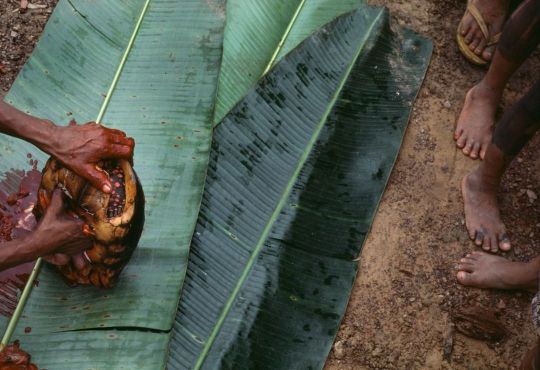
Gorotire - Índios Kayapó, 1983 photo by Miguel Rio Branco
#miguel rio branco#índios kayapó#brazilcore#kayapó#mine#indigenous#indigenous people#brasilidades#brasilidade#brasilcore#brazil#brasil#brasil aesthetic#brazil aesthetic#brazilian people#brazilian#povo brasileiro#indígenas#kayapós
160 notes
·
View notes
Text

Tupã by Kypris Aquarelas
#pagan#paganism#polytheism#tupã#tupa#tupan#brazil#brazilian#indigenous#indigenous people#art#watercolor#watercolour#painting#realism#colibri#beija-flor#caboclo#umbanda#candomblé#hummingbird#cocar#watercolours
9 notes
·
View notes
Text
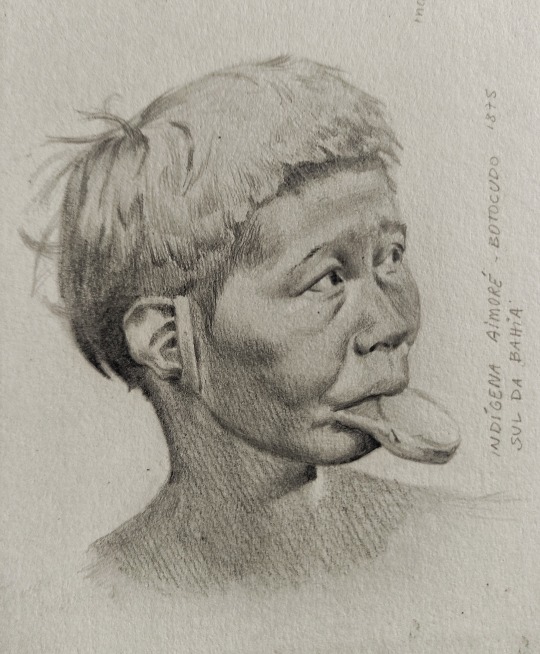
Mulher Indígena Aimoré 1875
Brazil
Grafite sobre papel
#black and white#brart#brartist#brazilian artist#graphite#art study#artstudy#academic art#academicart#artists on tumblr#artwork#art#indigenous#indigineous people#graphicwork#graphic design#graphic art#portrait#desenho
10 notes
·
View notes